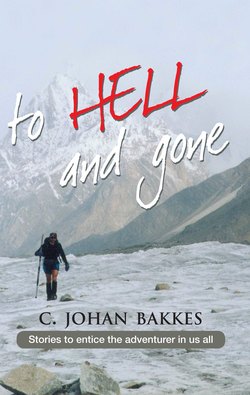Читать книгу To hell and gone - C. Johan Bakkes - Страница 11
На сайте Литреса книга снята с продажи.
ОглавлениеThe kukri
His mother and father and I just about grew up together. I say “just about”, because actually our respective fathers were hunting partners. Not hunting in a modern context, in their case. They did it the way it was done two centuries ago. Buffalo and elephant, lion and leopard. Hunting expeditions that lasted for three months, somewhere in German East Africa or Portuguese West Africa.
During those times we came from the Colony to stay with them in the Transvaal. My mom sent us to nursery school with them and we, West Coast children, learned about city kids. They ate grated carrots for lunch and were forced to take an afternoon nap – there was no playing on the beach in the afternoons and bringing home mussels.
The British, in their thirst for world domination, made use of vanquished or colonised nations to serve as canon fodder in their imperialist army. There were the Irish, who “took the penny”, the Indians, who tried to chase the Germans out of Tanzania at Tanga, the Australians, who fell in droves at Gallipoli, the South African Red Tabs, who surrendered at Tobruk, and then there were the Gurkhas. Fearless Nepalese. They were the assassin forces of the British. They were the ones who moved in behind the lines and soundlessly slit the throats of the enemy.
Every man chooses his own path, but paths are known to cross, and we three children of bygone days met up with one another again. The two of them were married with children and I had my own crew. Now that we were older, a firm friendship developed. Our visits usually ended with tales about hunting, guns, knives and other subjects close to an Afrikaner boy’s heart. I was aware of the little boy, listening enthralled to stories about his grandfathers and his father and lovingly stroking a rifle or a beautiful knife.
To kill a man noiselessly you need a good knife. The Gurkhas’ traditional weapon is the kukri, a long knife with a slightly curved blade, razor-sharp, with a notch at the base of the blade. It is heavy and can serve as a bush knife, to clear a path through the jungle.
The little boy was barely fourteen when the doctors announced that his father was dying; time left together was limited. In front of my eyes a big, active man of the veld changed into a shrunken, emaciated invalid. This brush with death influenced us all. The men withdrew. My wife, a psychologist, stepped in, took his hand and accompanied him on his journey to meet death. We hunters, who had often been killers ourselves, no longer had any desire to spend time together and invented furtive excuses not to talk about rifles and knives any more.
And somewhere along the line the little boy disappeared as well.
To escape, I went to Nepal. Rambling around in the kingdom of the mountains made me forget about death at home. In Katmandu I came across a kukri. To recognise a good kukri, you have to know something about knives. The heavy Gurkha knife has a certain point of balance and you test it by balancing it on your finger. I bought a beautiful specimen, razor-sharp and well balanced. At home I hung it on the wall – it was too beautiful to lock away in a safe.
At his father’s funeral the boy was sullen and apparently unemotional. He kept his distance, as if he knew that the role of carer would now be resting on his fifteen-year-old shoulders. His mother had to do her bit to keep the wolf from the door and he said farewell to puberty alone and defiantly. Now and then he would call on my wife. What they discussed, I had no idea.
He was in matric when I came home one day to find that the kukri was missing. When I learned that he had come round earlier, I knew at once what had happened to it. My first reaction was to fly into a blind rage. But I realised that this was a private matter between him and me.
The next day during school hours, I had him summoned on the intercom while I waited outside. A tall young man came sauntering towards me, his hands pushed into his pockets. He was clearly ill at ease. I could see his father in him. When he saw me, his bravado and nonchalance started to wane.
“My boy, don’t even try to feed me shit today,” I plunged straight in. “I know it’s just about the most beautiful knife a man could ever hold in his hand. Where is it, so that I can fetch it?”
He opened his mouth half-heartedly to protest. “If you’re honest with me, no one will ever know about it,” I added.
The almost-man became a little boy as he told me where it was.
As I turned to leave, he spoke in a soft voice: “Oom, I miss my dad.”
